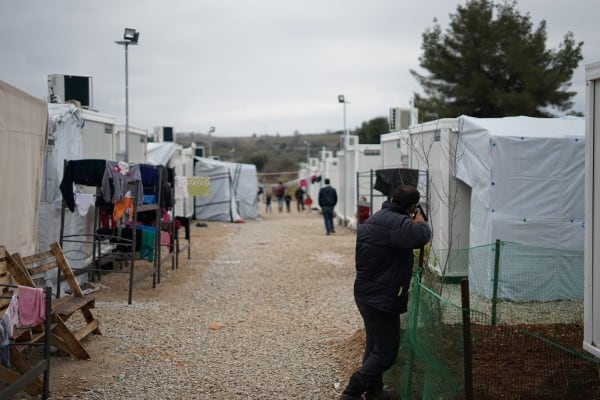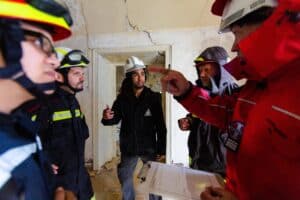This page contains affiliate links. This means if you a follow a link and make a purchase, at no additional cost to you, Humanitarian Careers will receive a commission. Thank you for supporting the site.
Humanitarian responses require many different types of jobs. Humanitarian NGO’s need technical staff to manage their programmes, such as in water and sanitation, education or shelter construction. Aid agencies also need staff in support type roles such as logistics, finance and HR that assist with the effective running of aid programmes. The humanitarian aid sector also has additional job types specific to the industry, such as cluster coordinators and camp managers, alongside crossover roles such as in project management and communications.
Here we’ve compiled a comprehensive list of job types within the humanitarian sector…
Emergency Response Personnel
Humanitarian Emergency Response Personnel deploy into emergencies to set-up aid programmes. Often urgently deployed at the onset of a crises by humanitarian agencies, the role of Emergency Response Personnel is to be the first responders in a humanitarian crisis. Covering most types of humanitarian roles, Emergency Response Personnel are deployed depending on what the humanitarian needs of the developing crises are. Humanitarian Emergency Response Personnel often set-up aid programmes in the first phase of the crises before passing it over aid workers deployed for longer missions.
Covering a many different types of humanitarian jobs, Emergency Response Personnel need to be on stand-by ready to deploy into a rapidly developing crisis. This means the job of the humanitarian Emergency Response Personnel can be to act as the first responders to earthquakes or floods, or setting-up aid projects to assist refugees who suddenly begin to move. Another key job of the humanitarian Emergency Response Personnel is to gap-fill for different types positions on humanitarian missions. Able to deploy quickly, humanitarian emergency response personnel are the ideal type of humanitarian role to provide short-term cover as needed.
Field Coordinator
The job of a Field Coordinator on humanitarian mission is to manage a base of operations. As the most senior person at a field base, the Field Coordinator oversees the finance, human resources, logistics and programme management of the humanitarian operation there. The Field Coordinator is usually managed by the team in the country office, often based in the capital, and is supported by technical advisors as needed. The Field Coordinator’s job is to ensure their base of operations is implementing the aid project effectively.
Covering many different types of aid jobs, the role of the Field Coordinator in a humanitarian mission is to plan and implement the aid project in a specific area of operation, as well as manage the base team. The job of the Field Coordinator is also to ensure safety and security at base level, supported by the country level security team. As the most senior staff member at a humanitarian base, Field Coordinators often manage many types of humanitarian staff and must cover a wide range of tasks and project types.
Head of Mission
The Head of mission is the most senior role in a humanitarian response. The job of Head of Mission is to manage a humanitarian NGO’s operations in a country. They have final oversight of all programmes, grants and support functions such as finance, logistics and HR. A key part of the job of Head of Mission is managing the humanitarian teams. As the most senior member of staff on a humanitarian response, the Head of Mission line manages the senior management team, who in-turn manage staff within their areas of operation.
The job of Head of Mission within a humanitarian response requires significant experience within the aid sector. As the Head of Mission oversees the NGO’s response across an entire country, they are also the direct link to the NGO’s headquarters or regional offices. The role of Head of Mission also has financial oversight of a humanitarian mission and has final control over budgets and cash management. In a large NGO the Head of Mission can also be known as the Country Director.
Humanitarian Aid Online Courses
If you are looking to work in humanitarian aid, we highly recommend the online course International Humanitarian and Development Careers. We think it provides one of the best overviews of the humanitarian sector and gives valuable insights for those searching for jobs in humanitarian aid. Follow the link to the course’s page for more information.
The International Humanitarian Law Theory and Practice online course offered by Leiden University in the Netherlands provides a fantastic theoretical overview of humanitarianism. We think it’s one of the top online courses for those who want to understand the basics of international humanitarian law. Click the link to visit the course’s page for more information.
We also think the Humanitarian Action Response and Relief online course offered by Coventry University is a must for anyone looking to become a humanitarian aid worker. It only takes around three weeks to complete and would be a major addition to the CV of anyone looking to work in the aid sector. The link is to the course’s page.
Human Resources Officer
Humanitarian missions often have large teams, spread across multiple field sites and areas of operations. The job of the HR Office is to oversee the day-to-day personnel management of the humanitarian mission. This includes being involved in recruiting and managing the rotation of staff, as well as developing policies covering staff conditions. The role of the HR Officer is also to manage the monthly payroll ensuring all staff receive their correct salaries and local taxes are accounted for.
The job of HR Officer is one of the key human resource roles in a humanitarian operation. On larger humanitarian missions, NGOs would have a HR Officer in each field base overseen by a HR Manager in the country capital. For smaller humanitarian missions, a single HR Officer may manage the country-wide HR processes. The job of HR Officer is also to make sure that that humanitarian mission stays compliant with all local employment laws, which can be challenging in places where local government has been weakened by crises and disasters.
Finance and Accounting Officer
The job of Finance and Accounting Officer in a humanitarian mission is to manage the financial aspects of the operation. Usually overseen by an Administration Coordinator, the role of Finance and Accounting Officer is responsible for processing invoices, holding cash and making payments as well as overseeing the financial processes. Large humanitarian missions will have a Finance and Accounting Officer per base of operation. Smaller humanitarian responses will have more senior types of finance roles usually based in the capital overseeing a wider scope of operations.
A key part of the job of Finance and Accounting Officer on a humanitarian response is overseeing the missions budget. Alongside the management team, the Finance and Accounting Officer will monitor expenditure, produce cash-flow plans and forecasts for future spending. The post of Finance and Accounting Officer in a humanitarian response can also work with other types of roles to assist with bringing money into the country. This can be a challenge if banking services have been disrupted by the disaster or conflict.
Logistician
There are many types of logistics jobs in a humanitarian mission. Logistics manages the procurement, shipment, storage and transportation of humanitarian aid. The post of Logistician is to manage all aspects of the humanitarian logistics operation. Other types of humanitarian logistics roles include Warehouse Officer – responsible for the storing and packing of aid goods, Procurement Officer – overseeing the purchasing of goods and Logistics Coordinators that manage the overall logistics operation in a humanitarian response.
Ensuring the correct supply of aid, at the locations needed, and in the condition, required is one of the main challenges in a humanitarian response. The job of the Logistician is to ensure all aspects of the humanitarian supply chain. Alongside the post of Logistician, humanitarian missions can also include specialist types of humanitarian logistics jobs such as Medical Logistician and cold-chain warehousing specialists. These types of jobs are required on medical humanitarian missions to ensure pharmaceuticals and medical equipment is transported, stored and used correctly.
Shelter Coordinator
When people are displaced by conflicts or disasters, shelter becomes one of the top needs for saving lives and protecting populations. The job of Shelter Coordinator is to manage the provision of temporary or longer-term shelter for people in need. The Shelter Coordinator can be responsible for establishing refugee camps if needed, as well as providing materials to people whose own homes have been damaged or destroyed as a result of the crises.
The job of the humanitarian Shelter Coordinator is to assess shelter needs, plan for the provision of shelters and work with other types of humanitarian roles to begin procuring and providing shelters and related materials. Alongside the Shelter Coordinator, a humanitarian mission may have other related types of shelter jobs such as engineers and architects. These specialist positions work as part of the wider shelter team to provide technical assistance to the humanitarian shelter response.
Grants Manager
Humanitarian NGOs take grants from donors to fund their work. There are many types of humanitarian jobs that oversee the management of these grants. The role of the Grants Manager is to coordinate the NGO’s portfolio of grants for a humanitarian response. This includes working directly with the donors, writing reports, feeding into the grant budget and applying for any extensions or alterations of the grant that are needed as the humanitarian crises develops.
Alongside the job of the Grants Manager, large humanitarian responses will have a Grants Officer who assists the Manager in the coordinating the grants. There are also other types of humanitarian jobs that work with donor grants. These include Reporting Officers who are responsible for ensuring donor reports are developed accurately and delivered on time. Another type of humanitarian job large NGOs will have for grants is Proposal Development or Programme Development Officers, whose jobs are to write new funding proposals.
WASH Engineer
In the humanitarian sector WASH stands for water, sanitation and hygiene. Ensuring people in need have access to clean water, safe and accessible toilets and personal hygiene is a key part of many humanitarian responses. The job of the WASH Engineer is to design and oversee the inputting of water and sanitation infrastructure such as sewage systems. WASH Engineers work closely with the WASH Programme Managers who coordinate the humanitarian NGO’s water, sanitation and hygiene programmes.
As well as WASH Engineers, there are many types of humanitarian jobs related to water, sanitation and hygiene. These include refuse workers, who ensure sanitation through the correct disposal of waste, usually in a refugee camp setting. Another type of water and sanitation humanitarian job is the WASH Technician or consultant. They work supporting the WASH Engineer by providing specific technical skills in the development of water and sanitation systems needed by a humanitarian response.
Nutritionist
Nutrition is can be one of the key needs in a population affected by humanitarian crises. The job of the humanitarian Nutritionist is to assess the nutritional need of a crises affected community and establish programmes to ensure adequate food provision. The post of Nutritionist in a humanitarian response is either of the type that provides technical advice on nutritional needs, known as the Nutrition Advisor, or the type known the Nutrition Programme Manager that also has project management oversight of the humanitarian nutrition response.
The job of Nutritionist on a humanitarian mission is often supported by several different types of jobs. Humanitarian nutrition focuses mainly on babies and young children as the affects of malnutrition on their development can be one of the major impacts of a humanitarian crises. The post of Infant and Young-Child Feeding in Emergencies (IYCF-E) Councillor is one of the main types of jobs supporting the humanitarian nutritionist. Another type of nutritionist humanitarian job is the Nutrition Programme Officer who assists with the project management of the nutrition response as well as helping with technical inputs.
Medical Coordinator
The Medical Coordinator is one of the most senior job types in a humanitarian medical mission. The Medical Coordinator has project management and technical oversight of a humanitarian medical response. The Medical Coordinator works managing the medical programme, including ensuring inputs such logistics, budgets and staff are in-place as needed, as well as giving technical inputs such as medical trainings, developing tools and conducting assessments. The Medical Coordinator, and similar types of humanitarian medical programme management roles, also manage the medical team staff.
As well as the job of Medical Coordinator, there are many types of humanitarian jobs in the medical field. These include Health Programme Managers; whose role focuses more on the project management aspects of implementing a humanitarian medical response. Humanitarian medical missions also need a wide range of more standard types of medical jobs, such as doctors, nurses, midwives, paramedics and medical technicians. Many humanitarian medical responses also employ a type of job known as a Community Health Worker that comes directly from the crises affected community.
MHPSS Coordinator
Mental health and psycho-social support (MHPSS) is fast becoming one the most important areas within humanitarian work. People affected by crises, disasters and wars can have a wide range mental health issues as a result. The job of the MHPSS Coordinator is to run the mental health programmes as part of a humanitarian response. This can include imbedding mental health care into an existing medical humanitarian response, or increasing capacity within disaster affected health systems to include provisions for mental health.
There are many types of humanitarian MHPSS roles that work alongside the MHPSS Coordinator. Humanitarian NGOs will recruit psychologists and counsellors to work directly with people with mental health needs. Other types of MHPSS jobs within the humanitarian sector include MHPSS Technical Advisors, who provide technical inputs to the design and implementation of mental health projects, as well as MHPSS Project Managers. Their job is to combine the technical expertise needed to run a humanitarian MHPSS programme with project management and grant requirements.
Protection Specialist
Protecting the vulnerable during a humanitarian crisis is one of the top priorities of many responding NGOs. Groups such as women, children, those with disabilities or sexual minorities can become especially vulnerable when communities are disrupted by humanitarian emergencies. There are many types of humanitarian jobs that work in protection. The position of Protection Specialist covers a wide range of protection needs including preventing gender-based violence (GBV), protecting children from exploitation or establishing safe spaces for vulnerable groups in refugee camps.
As well as the position of Protection Specialist, there are a wide range of types of jobs in humanitarian protection. These can include programme managers focusing on GBV or child protection. Another type of humanitarian job within undertaking protection work is the case worker. Their role is to take on the cases of with specific needs and work directly with those requiring access to services for their protection.
Food Security and Livelihoods Coordinator
Ensuring secure access to food, and the ability to preserve livelihoods, during a humanitarian crisis is crucial to meeting the affected people’s needs as well as saving lives and allowing for recovery. The job of the humanitarian Food Security and Livelihoods (FSL) Coordinator is to manage an NGOs projects focusing on food access as well as run projects aiming to provide, or secure, peoples livelihoods during a humanitarian emergency. The FSL Coordinator on a humanitarian mission can be supported by several types of jobs including the FSL Officer or FSL Project Manager.
When humanitarian NGOs respond to a crisis and assess that food provision and livelihood development is required, they often deploy FSL Coordinators to establish projects. As well as the post of FSL Coordinator, there are other types of humanitarian jobs that respond to food security and livelihood needs in crises affected populations. These can include Programme Managers running specific interventions such as micro-finance projects or food distributions, as well as FSL Technical Advisors.
Safety and Security Manager
Humanitarian NGO’s often have to operate in insecure environments. Areas affected by disasters and armed violence pose a range of security concerns. The job of Safety and Security Manager on a humanitarian mission is to oversee the security of NGO staff, premises, movements and operations. Often based in the country office, the Safety and Security Manager can line manage similar types of roles based at field office level. Humanitarian missions in more insecure countries, such as Iraq, Yemen and Afghanistan have more extensive safety and security staffing.
As well as the role of Safety and Security Manager on a humanitarian mission, there are many types of roles that work within NGO security. These include Security Consultants, who do short-term assignments usually to develop security tools and practices for NGOs. Other types of jobs within the humanitarian sector that work on safety and security are also logistics coordinator and operations staff. Often when humanitarian missions are not large enough, or operating in a more secure context, security management will sit under these roles.
Programme Manager
The job of Programme Manager in a humanitarian response is to oversee the successful implementation of an NGO’s operation. Covering many types of different projects, the job of the Programme Manager combines the technical knowledge needed to run the humanitarian programme, such as WASH, Protection or Nutrition, with the project management experience to ensure smooth implementation. The post of Programme Manager in a humanitarian response coordinates between the grants, finance, logistics, HR and technical advisory team to manage the day-to-day running of a humanitarian programme.
There are many different types of Programme Manager jobs within the humanitarian sector. These can roughly be broken down into ‘non-technical’ Programme Manager roles. These jobs focus more on the operations, grant development, budget management and planning of projects. The other type Programme Manager jobs within humanitarian aid are technically focused and combine the project management work with technical inputs such as in FSL, Shelter or Education programming.
Cash Transfer Specialist
The humanitarian industry is beginning to move more towards providing direct financial assistance to people affected by crises, rather than physical aid. This is more efficient for aid agencies to deploy and gives greater choice to beneficiaries, whilst also supporting the local market directly. The main type of roles that oversee humanitarian cash transfer programming are the Cash Transfer Specialist, or Cash Transfer Programme Manager. Some types of cash transfer projects can also be managed by the FSL Coordinator.
There are many types of jobs within humanitarian cash transfer work, with different focuses and specialisms. Some types of cash transfer jobs focus on the establishment of cash transfer programmes, including assessing local markets, reviewing the needs of the affected population and determining cash delivery systems. There are also types of cash management specialist roles that focus on the running and transition of humanitarian cash management programmes, including on cash distributions and working on how the project can be made sustainable.
Camp Coordination and Camp Management
The job of Camp Coordinator and Camp Management (CCCM) in a humanitarian response is to set-up and manage refugee and internally displaced persons (IDP) camps. People fleeing conflicts and disasters need urgent settlements and camps are set-up when populations need shelter. The job of CCCM Manager within a humanitarian response coordinates other technical and programmatic areas to ensure camps are established in-line with the correct standards and guidance.
There are many types of jobs within humanitarian CCCM. These include Camp Officer and Managers, as well as Directors who have final oversight of entire camp settlements. There are also types of CCCM jobs that work directly with local authorities of the host community to coordinate access to services for refugees and IDPs. Another type of CCCM job within the humanitarian sector is the CCCM Project Manager, who combines project cycle management with practical camp management.

Education Manager
When communities are hit by crises children’s education becomes disrupted. Humanitarian NGO’s run programmes providing education to children who would otherwise go without. The Education Manager is a type of job that oversees the running of education programmes within a humanitarian response. Similar job types include Education Programme Manager and Education Officer. These types of roles all focus on establishing educational programmes, designing or securing curriculums, as well as setting-up and running schooling facilities and encouraging enrolment.
Alongside the post of Education Manager, humanitarian NGO’s require many types of educational positions to assist with their education programmes. Teachers, ideally from the affected community, are hired to provide lessons and other types school staff such as managers and support staff are hired for larger education programmes. Humanitarian NGO’s working on education also employ different types of jobs to advocate for children’s education and encourage parents to send their children to school.
Communications Officer
There are many types of jobs within humanitarian responses that manage communications. Communications Officer’s oversee the day-to-day communication both within a humanitarian mission – ensuring information is shared and updated between bases of operations and with the NGO’s HQ, and externally with media sources. NGO’s will bring onboard a Communications Officer full-time on a larger humanitarian mission, or have a Communications Officer and other types of Comms roles that deploy from HQ to different response as needed.
Alongside Communications Officers and Managers, humanitarian missions can require different types of communications jobs as well. Some of the other types of comms jobs needed on humanitarian missions can include media liaison positions that work promoting the NGOs work as well as social media roles. Another type of communications role that humanitarian missions can have are Information Management Officers. These jobs focus more on the storing and management of information as well as data and record collection.
Monitoring and Evaluation Manager
Humanitarian NGO’s need to monitor and evaluate their aid to ensure there are reaching the target population and that the aid is being delivered effectively. There are several types of roles within humanitarian responses that can oversee monitoring and evaluation. The Monitoring and Evaluation (M&E) Manager is responsible for data collection, inputs and analysis. They often manage the Data Inputs Officers or M&E Assistants.
Within many humanitarian NGO’s monitoring and evaluation has been expanded to cover other types of analysis. The position of Monitoring, Evaluation, Accountability and Learning (MEAL) Manager includes M&E but also focuses on ensuring aid projects are accountable to both the beneficiaries who receive aid and the donor who funds the projects. MEAL Managers, and sometimes similar types of roles including Learning Consultants, also work on ensuring humanitarian responses record learning outcomes and organisational development can be improved through learning.
Cluster Coordinator
Humanitarian responses are divided into clusters of operations. Determined by the UN, the cluster system is aimed at improving coordination between humanitarian actors. Clusters such as Logistics, Education, Shelter and Nutrition cover the main aspects required within each humanitarian response and work to coordinate between the NGO’s working in each area. The main type of job within the cluster system is the Cluster Coordinator. Each cluster employs a team to manage the coordination which is led by the Cluster Coordinator.
The Cluster Coordinator works to create forums within a humanitarian response where NGOs can coordinate activities, including where, what and how aid is to be delivered. Reducing duplication in aid provision and improving efficiency are the key aims of all types of external coordination roles within humanitarian responses. Cluster Coordinators, and related types of cluster jobs such as NGO Forum Coordinators, also work to advocate on behalf of humanitarian NGO’s with local authorities and international bodies.
If you want to learn more about how to become a humanitarian worker, explore our list of the top humanitarian aid online courses here.






